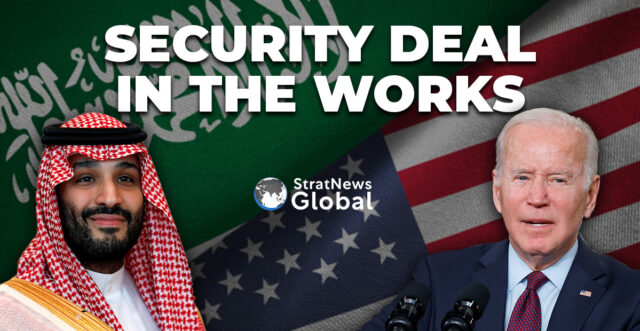While the war in Gaza rages on and Iran mourns the loss of its president in a helicopter crash on May 19, there is another interesting development taking shape elsewhere in the region. The Saudis and the US are reportedly very close to a ‘security deal’ which has been in the works for over a year, much before the war broke out in Gaza. Inputs suggest that President Biden is very keen to close the deal while he still has the time during his current presidency.
Does it remind of something similar, four years back? Yes, the Abraham Accords too were signed in September 2020, months before President Trump lost the elections to Biden. As the current deal takes final shape, there are a number of serious concerns that need to be addressed before such an agreement comes about, lest it may cause discontent and frustration in the West Asian region.
What Is The Saudi-US Deal?
The Saudi-US security deal is basically a progression of the Abraham Accords seeking further integration of Israel in the region. Just before the ongoing war in Gaza broke out, reports of Saudi-Israel normalisations were going strong. This is considered to be a crucial trigger for the October 7 terror attacks on Israel by Hamas. Under the Saudi-Israel normalisation deal, Saudi Arabia was to get ‘iron clad’ security guarantees from the US and a civilian nuclear programme. Israel was to offer ‘assurances’ to Palestinian groups without any clear outcome on the two-state solution. The war in Gaza, however, completely derailed this normalisation process. With Netanyahu ruling out a two state solution, the normalisation process looks consigned to cold storage, at least for now.
What Do The Saudis Get?
The US is now pursuing an important subset of it, i.e. a security deal with Saudi Arabia with ‘iron clad’ security guarantees. Under this deal, the US is likely to provide specific security guarantees to Saudi Arabia which might include positioning of troops and anti-missile defence systems. Additionally, Saudi Arabia is also seeking a nuclear programme to be established by the US, which should include provisions for upscaling it to a nuclear weapons programme should Iran or any other country in the region becomes a nuclear weapons state. However, the deal hinges on one important precondition set by Saudi Arabia: “A two-state solution that meets the aspirations and legitimate rights of the Palestinian people”.
On May 19, Jake Sullivan, the US National Security Adviser, visited Riyadh and met Saudi Arabia’s Crown Prince Mohammed bin Salman to discuss the deal. An official statement stated the “semi-final” version of the security deal has been agreed to, and what is being worked on between the two sides in the Palestinian issue is to find a credible path. Sullivan thereafter flew into Israel to meet PM Netanyahu to impress upon Israel to end the war in Gaza, if there is to be any hope of a future normalisation.
Going Back To Abraham Accords
The Abraham Accords were primarily aimed at creating a US-Israel led bloc with Arab countries against the ‘Axis of Resistance’ comprising Iran and allies in Yemen, Iraq, Syria and Lebanon. The accords were signed between Israel and the UAE in September 2020, months before the US presidential elections which Trump lost.
How did Abraham Accords come about? Again, it was borne out of threats from enemy No.1, Iran. There was a clear understanding that Iran had to be reined in and Israel could to be aligned with the Arab nations for the region to be safe from Iran’s military threats. Most of the Arab countries were on board with the proposition, owing mainly to the military threats which were posed by Iran backed Houthis in the ongoing war in Yemen in 2019-20.
To recount some of those threats from Iran, there was a spurt in attacks by Iran-backed Houthis involving attacks on oil tankers in the Strait of Hormuz as well as missile attacks on Saudi airports and oil pipelines in early parts of 2019. Most of strikes were through drones or missiles which originated from Yemen but bore clear signatures of Iran. There was also an incident of downing of a US drone by Iran flying over its airspace on June 20, 2019. US President Trump had ordered retaliatory military strikes against Iran to be executed at dawn on June 21, before changing his mind at the last moment. All this caused serious alarm in Arab capitals.
What Abraham Accords Overlooked
This was therefore the perfect opportunity to integrate Israel closer with the region and the Abraham Accords were the result of this sustained effort, which was clearly aimed at exploiting the narrative of Iran being the common enemy of the region. However, it completely overlooked the most fundamental issue of friction and discord between Israel and the Arab region, i.e. the Palestine issue.
Although the text of Abraham Accords signed with UAE stated, “Committing to continuing their efforts to achieve a just, comprehensive, realistic and enduring solution to the Israeli-Palestinian conflict”, nothing ever moved forward. So, as a follow-up to the Abraham Accords, when news started filtering in second half of 2023 about Saudi-Israel normalisation, there was an absolute sense of abandonment and loss of hope among the Palestinian groups, which is considered as one of the important triggers for the Gaza war.
How Would Saudi-US Deal Affect The Region?
For starters, it could immediately raise concerns that Saudi Arabia is abandoning its commitment towards the core issues in the region, i.e. the Palestine Issue, despite the text in the deal possibly containing sentences towards a Palestine solution. Remember the text of Israel-UAE Abraham Accords?
Secondly, it would signal going back on a fundamental US policy adopted since 2015, i.e. not to get actively involved in any regional security issues of West Asia. Giving ‘iron clad’ security guarantees would imply that US would be bound to physically intervene in case Saudi Arabia is militarily threatened.
It also raises another important issue. The US has always been seen to provide an overall security umbrella to the region. How would a deal with Saudi Arabia enhance or change this overall understanding? Also, in the past, security umbrella was required because Iran was considered a persistent and live military threat.
The Saudi-Iran Deal
But remember, Saudi Arabia and Iran signed a peace deal in March 2023! Developments following that and the close coordination between Arab countries and Iran in the past one year, including the Gaza war, do not indicate any emerging animosity or threat from Iran. In fact, on the nuclear issue, Iran has publicly offered to help Saudi Arabia and other countries in the region to establish a civilian nuclear program.
Also, the Gaza war has cleared witnessed the emergence of Iran as a major military power which can take on the might of Israeli defence forces head-on. It has also emerged as the major backer in the actual fighting for Palestine through its proxies, in the Gaza war. But, it has not come with any indication of any Iran posing any military threat to the region.
So, if the previous security umbrella to the region worked fine when Iran was still a rival and adversary, why a specific deal now when Iran and the region are already making peace with each other? And if this is being seen as a precursor to the Saudi-Israel normalisation process, we are back to square one, i.e. no deal can succeed unless there is an end to the war in Gaza and a concrete and mutually acceptable (including Israel) to the two-state solution.
A Word Of Caution
It seems that the US is trying to rush through a security deal with Saudi Arabia. For now, it seems Saudi Arabia, while agreeing to basic principles, is firm on the core issue of Palestine to be resolved first. Four years back too, a similar situation and assurances by the US led to the signing of Abraham Accords. Today, it lies in tatters because the core issue of Palestine, though included in the accords, never progressed any further. In fact, the Saudi-Israel normalisation process was an attempt to go around the core issue. The result: loss of hope and frustration among the Palestinians which led to the Gaza war.
We can hope the US and Saudi Arabia will keep the lessons of the past in mind and not rush through a process which may get undermined in the future, threatening the fragile peace and security of an already turbulent region.
(Col. Rajeev Agarwal (Retd) is Assistant Director at MP-IDSA, New Delhi. He has previously been Director, Military Intelligence, and Director in the Ministry of External Affairs. Views expressed in this article are personal.)
Col. Rajeev Agarwal (Retd) is Assistant Director at MP-IDSA, New Delhi. He has previously been Director, Military Intelligence, and Director in the Ministry of External Affairs. Views expressed in this article are personal.





